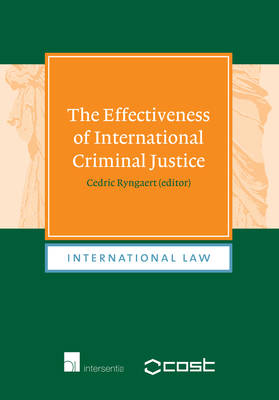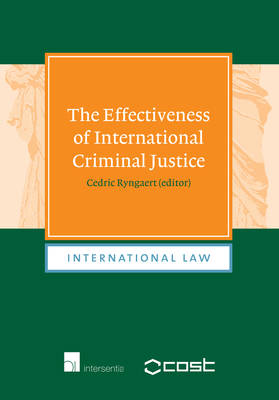
- Afhalen na 1 uur in een winkel met voorraad
- Gratis thuislevering in België vanaf € 30
- Ruim aanbod met 7 miljoen producten
- Afhalen na 1 uur in een winkel met voorraad
- Gratis thuislevering in België vanaf € 30
- Ruim aanbod met 7 miljoen producten
Omschrijving
This edited volume ascertains the added value of international criminal tribunals in fighting impunity for crimes against international law and fostering political reconciliation in affected States. It aims to identify best practices which may inform the choice between the establishment of international criminal tribunals and recourse to other mechanisms, and which may render existing or future tribunals more effective institutions.
A first part analyzes how such tribunals, if the international community decides to establish them, could be effective institutions. Obviously, the tribunals’ conduct of their own legal proceedings, within their mandate, may go a long way to make the tribunals effective mechanisms of post-conflict justice (e.g. prosecutor’s choice of suspects, outreach, human rights protection, victims’ participation…). It will be argued, however, that effectiveness will, in fact, for a large part depend on factors outside the tribunal’s control, such as the presence of the right political parameters and the financial, logistical, and other support of States.
A second part of the volume contrasts international criminal justice with other judicial or political mechanisms aimed at dispensing justice or reconciling communities. An answer will be sought to the question whether national, as opposed to international justice avenues, amnesties for grave crimes, or restorative justice mechanisms (reparations, housing restitution) could sometimes be more effective than international criminal tribunals.
With contributions by: Erik André Andersen, Mikaela Heikkilä, Masha Fedorova, Sten Verhoeven, Jan Wouters, Brianne McGonigle, Sudeshna Basu, Inneke Osea, Louise Mallinder, Peter Malcontent and Antoine Buyse.
“[…] the choice of topics addressed and the book’s approach are very interesting. One can be delighted with this contribution on international criminal law at a time when international criminal justice is on a quest for its identity.”
-- Iryna Grebenyuk in RSC – Revue de science criminelle et de droit pénal comparé (2010) 510.
“[This] book engages some of the most complex theoretical and practical deficiencies in international criminal justice and addresses them, on the whole, with admirable intellectual integrity. … The contributors eke out each strand of [the] debates and unravel the arguments. …It is this nuanced engagement with extremely complex and emotive topics that puts this book in the centre of the transitional justice dialogue. … It integrates detailed analysis within the broad landscape of some of the most pressing questions in international criminal justice; and it asks the questions which many who work and study in this field tend to ignore. The book is a pivotal tool in not only understanding some of the more contentious issues in the efficacy of international criminal justice; it is also an important base for ensuring that international criminal justice not only exists but is also a powerful and effective tool in the pursuit of justice.”
-- Bonita Meyersfeld in 2011 SAJHR 374
Specificaties
Betrokkenen
- Auteur(s):
- Uitgeverij:
Inhoud
- Aantal bladzijden:
- 280
- Taal:
- Engels
- Reeks:
Eigenschappen
- Productcode (EAN):
- 9781839702662
- Verschijningsdatum:
- 17/08/2009
- Uitvoering:
- Paperback
- Formaat:
- Trade paperback (VS)
- Afmetingen:
- 160 mm x 240 mm
- Gewicht:
- 600 g

Alleen bij Standaard Boekhandel
Beoordelingen
We publiceren alleen reviews die voldoen aan de voorwaarden voor reviews. Bekijk onze voorwaarden voor reviews.











